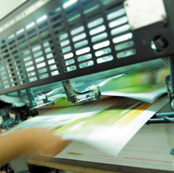Paper for Beginners
Our Where Can I Find... Paper section will help you find specialist paper suppliers, but there's no reason why you should buy special paper until you're sure you can make the most of it.
Copier paper is handy to practice on. It's nice and smooth, cheap and readily available. For something with a little more finesse, choose a 300gsm+, creamy-coloured inkjet paper.
For beginners, smudging is almost inevitable with coated papers (eg ‘photo’ paper), so steer well clear of these. Coloured papers can be hard to work with, too. If you want to be able to read what you've printed, choose nothing darker than a pastel shade.
Whatever you're printing, use a paper that's considerably lighter in shade than the ink. Printing a pale colour on dark paper is something you can experiment with when you're more confident (white ink is the hardest to get right, it rolls and spreads out in an odd way).
Handmade papers have a textured surface which can make text unreadable, although the finer quality ones can be used for things like woodcuts and woodletter, so long as you're happy with a textural finish.
Are There Special Letterpress Papers?
There is a revolution that has happened, towards the end of the last century, in the commercial printing industry which you'll need to understand. In essence, Letterpress technology has been replaced by offset-lithography (itself soon to face a final battle with various versions of digital imaging).
The paper industry has had to modify its products to suit.
Back in the days of letterpress, the need was for a sheet that took kindly to localised areas of pressure, as each letter or piece of image was pressed hard onto – and into – the sheet.
Paper was made with effectively two good surfaces (although, mostly, the two sides didn't quite match in smoothness) and with a relatively open, internal micro-structure of fibres holding those two surfaces somewhat apart — like a sort of sandwich. You had a rather bulky sheet, with quite a bit of compressibility. Water content, remaining from manufacture, was of relatively little importance (within limits!).

Offset-litho (and also gravure, a printing method used for long runs) needed smoother surfaces and they had no need to cope with small areas of compression; just a desperate need to control water content precisely. Getting control of remnent water content was very difficult indeed. The porous centre in letterpress sheets, which held a good deal of moisture, had to be eliminated.
The struggle to control water content continued over a number of years, whilst smoothness improved, and vast amounts of paper were wasted as the craftsmen struggled with paper too damp or too dry.
Today we have a situation where the big mills mostly make thin, smooth, hard sheets for commercial printers, with few exceptions. These sheets, especially in the lighter weights, will show impression on the back of any but the most carefully made-ready letterpress formes.
Stephen Fry
There are of course the small, specialist mills – supplying the art and print-making trade – and some of these still make sheets that really do suit letterpress. The small amounts produced are necessarily expensive per sheet, but working with them is a revelation and a pleasure. John Purcell Fine Papers Ltd are a principal merchant in this sort of sheet, and generally most helpful. There are one or two bigger mills in the UK that still make sheets for book printers that we can usefully use. Tullis Russell is one, but you have to buy their sheets in large size (450 x 640mm) 500 sheet packs at commensurate cost. Their ‘Mellotex’ range in the heavier weights is particularly recommended.
For illustration, loading and sizing of the paper are both relevant to some of the art processes, and we recommend talking to your paper merchant about that (or Lawrence's).
You Might Also Like...
